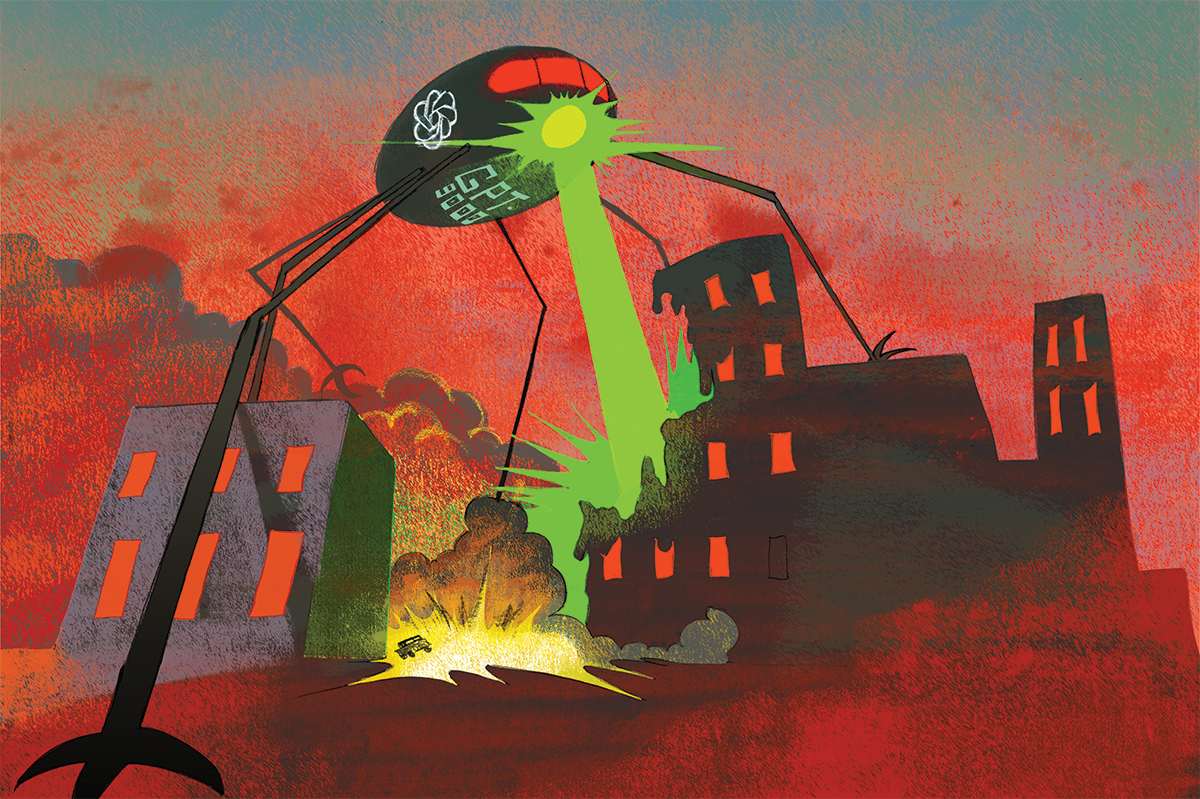The pleasures of detective fiction
In the latest issue of The Lamp, B.D. McClay writes: “Detective stories have long been thought of as ‘smart’ genre entertainment, something people openly profess their enjoyment of no matter how status-anxious they are.” It’s true that most people are happy to admit to enjoying detective fiction. The same goes for science fiction, which is surely more “respectable” than romance. Yet, however quick people may be to admit to these pleasures, for some, they remain guilty ones — or at least mere pleasures.
Such was — and I am assuming still is — the case for Arthur Krystal when in a 2012 piece for The New Yorker he wrote that a work of genre fiction, however expertly executed, is always constrained by the convention of plot, which limits a writer’s ability to explore ideas or style with nuance or flair:
The typical genre writer keeps rhetorical flourishes to a minimum, and the typical reader is content to let him. Readers who require more must look either to other kinds of novels or to those genre writers who care deeply about their sentences. Raymond Chandler, for one, professed not to care “a button” for the hardboiled form, yet he wanted to write good hardboiled fiction. To do so, he downplayed plot and concentrated on “experiments in dramatic dialogue…what Errol Flynn calls ‘the music,’ the lines he has to speak.”
Still, he knew that certain expectations must be met, since it’s the formulaic nature of genre writing (variations serve to underscore such expectations) that keeps us coming back. The reason that Wittgenstein eagerly awaited his monthly copy of Street & Smith’s Detective Story is the same that prompted Nadezhda Mandelstam to ask visitors to bring her Agatha Christie’s latest. Neither one was after startling revelations about nature or society; they simply wanted the comfort of a familiar voice recounting a story that they hadn’t quite heard before. Call it a vice (Edmund Wilson does), call it an addiction (Auden’s word), a guilty pleasure in book form simply means time off from heavy lifting or heavy reading.
Raymond Chandler doesn’t go as far as Krystal in his classic essay “The Simple Art of Murder,” but he does argue that many detective stories are ruined by implausible plots. Fiction is a realistic art, according to Chandler, and most detective stories aren’t believable enough to work. He takes aim at A.A. Milne’s “The Red House Mystery” in which he finds more than a few errors of logic.
Genre fiction for Chandler is not a literature of escape or mere pleasure. All reading, he writes, is done for pleasure. The problem is that convention and realism are at odds, and realism is where it’s at. Both Agatha Christie and Dorothy Sayers fail “intellectually” and “aesthetically,” he writes, because they give too much away to convention.
But this is a false distinction. Chandler misses, McClay writes in her piece, what “the detective story can gain through a kind of artificially rational scheme”:
The murders in these stories are often, as he points out, absurdly complex, practically Rube Goldberg machines. But the meticulousness, even tidiness, of the murders, alongside the placid surface of social life, throws the unpredictability of human hearts into relief. Violence, impulse, hatred, and stupidity all remain, but under wraps, pulled out into the open by the actions of, first, the murderer, and then, the detective.
Another way to put this is that the realism of detective fiction is not found in plausibility of its premise and plot. It is found in the plausibility of human nature presented through the lens of that plot.
Adam Fleming Petty makes a similar point to McClay’s in his essay on John D. MacDonald’s Travis McGee novels: “I picked up my first McGee volume at a used book store,” he writes. “I drifted over to the crime section, in the mood for a book where stuff actually happens.” He falls in love with the series:
The sleuths of early L.A. noir were self-torturing knights errant, adhering to a code of morality in a world gone wrong. Not so the protagonists of Florida glare. The moral fabric of the Sunshine State has long gone to tatters. Laws are nothing more than a means for real estate developers to pave over the Everglades. The best that McGee and those who follow in his footsteps can hope for is decency, at an individual level. That may sound cynical on its own, but a consequence of McGee’s stance is that he never looks to be the hero of the story. He has no interest in glory for its own sake. …McGee is neither monk nor cad. He is a paradigmatic example of an American type. He is A Guy. And being A Guy, I would submit, is one of the best things a man can be.
Everyone wants A Guy in their lives. They want to know A Guy. They want to tell their friends, “I got A Guy.” When you find yourself entangled in trouble, to the point that no other institutions or authorities can help you, that’s when you need A Guy.
Above all else, A Guy is useful. He solves the problems no one else does. Common law husband run off with your inheritance? McGee can handle that. Niece get swindled by a con artist? McGee knows how to track him down. He is a tool precisely fitted to a specific task, like a — a socket wrench, maybe? I admit I’m not A Guy like McGee, and never will be. But I can still try, in my own modest way, with McGee as my shining example.
All fiction — all art — works within conventions. Realism itself is a convention. The question is what a writer does with those conventions.
In other news
Is the famously reclusive novelist Thomas Pynchon on Twitter?
A user of the r/ThomasPynchon board on Reddit has noticed something unusual. Paul Thomas Anderson, who adapted Pynchon’s book Inherent Vice, has a new film, Licorice Pizza. A character in Licorice Pizza is an old guy in the movie business named Sam Harpoon. Harpoon appears to have “his” own Twitter account where he posts fictional movie anecdotes, in what feels like a tribute to the rambling Facebook posts of Taxi Driver and Raging Bull screenwriter Paul Schrader. …Could Pynchon be tweeting as a minor character from a Paul Thomas Anderson film?
The so-called “elite” of the American literary world don’t know their classics. That’s more of a middle-class autodidactic kind of thing:
When I attended an MFA program, about halfway through this self-education project, I realized that I had done far more work than was common. All of my classmates had majored in English in college (I had majored in Economics), and almost none of them had read the books I’d been told an educated person ‘must’ read. Forget about reading Homer, most hadn’t read Middlemarch or David Copperfield. To the extent that they were influenced by literature, it was by recent American literature: Raymond Carver and Denis Johnson were popular influences. Virginia Woolf, at least, had some adherents, but even the modernists weren’t terribly popular, though most had some familiarity at least with Faulkner and Hemingway. …As I’ve grown older and gotten to know the literary world better, I’ve seen little interest among even literary elites in Classic literature. To the extent that people are excited by literature, it’s by comparatively recent writers: Žižek, Barthes, Naomi Wolf, Audre Lorde, Gloria Anzaldúa, Toni Morrison. Among “Classic” writers, only Jane Austen, the Brontë sisters, and Shakespeare retain any hold on the imagination of the average writer, while the influence of the Italian Renaissance, Middle Ages, and Greek and Roman antiquity is virtually nil.
Foreign films and TV shows have never been more popular in the anglophone world. So why are so many subtitle translators leaving the industry? Poor pay, of course. The Vikings first set foot on North American soil (in Newfoundland) in 1021 new research shows: “Tree ring evidence of an ancient solar storm enables scientists to pinpoint the exact year of Norse settlement.”
A 25th-century BC “sun temple” is believed to have been discovered in Egypt. A “team uncovered the remains buried beneath another temple at Abu Ghurab, around 12 miles south of Cairo, mission co-director Massimiliano Nuzzolo, an assistant professor of Egyptology at the Polish Academy of Sciences’ Institute for Mediterranean and Oriental Cultures in Warsaw, told CNN on Monday.”
Carl Rollyson reviews a new biography of the American fascist Joseph P. Kennedy:
When he arrived in England in early 1938, he quickly found a home among the ruling elite who believed, as Susan Ronald puts it, that “fascism was the cure for communism.” Notwithstanding FDR’s unprecedented provocation of sending an Irishman with no diplomatic skills to Great Britain, Kennedy immediately sided with Prime Minister Chamberlain and the appeasers, believing that any deal with Hitler—no matter how humiliating and lethal to the lives of millions—was preferable to war. Kennedy never stopped believing that Hitler could be bought off, that businessmen could do business with fascists.
Welcome to the world of TikTok book “reviews”: “Stuck inside during Sydney’s Covid lockdown, I fell down the endless TikTok abyss, where I found BookTok: the app’s reading corner that has amassed more than 26bn views. There, I spent more time watching people talk about books than actually reading books myself.”
Abe Greenwald reviews John McWhorter’s Woke Racism:
If the United States manages to put down the woke revolution, it will be because a critical mass of liberals chooses to reject it. …Among the dozen or so prominent liberals who have answered this call, John McWhorter has taken on an invaluable role. McWhorter, a linguistics professor at Columbia University, is less consumed with particular woke-inspired outrages than with getting at the substance of wokeness itself and the threat it poses to his fellow black Americans. On those matters, his new book, Woke Racism, makes several major contributions.

























